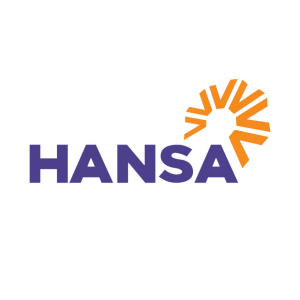Imlifidase met primary endpoint in 16-HMedIdes-12 phase 2 trial in patients with AMR following kidney transplantation
Statistically significant reduction in donor-specific antibodies (DSAs) observed among imlifidase patients within five days of treatment as compared to standard of care
In the trial, the primary endpoint was the maximum reduction in DSA level at any time point during the 5 days following the start of treatment. Patients treated with imlifidase demonstrated a statistically significant reduction of DSAs by
The secondary endpoint investigated overall kidney function following treatment. The imlifidase arm demonstrated a
Dr. Achim Kaufhold, Chief Medical Officer, Hansa Biopharma said, "This is the first clinical trial with a head-to-head comparison of imlifidase and a frequently used standard of care treatment (plasmapheresis, or plasma exchange). Plasmapheresis can be challenging for both the patient and the physician, often requiring multiple treatment sessions over several weeks with slow reduction in donor specific antibody (DSA) levels. We are very encouraged by these results which underscore imlifidase's ability to rapidly reduce DSA levels, which is good news for patients who require safe and efficient reduction of DSA levels."
Prof. Stanley Jordan MD, Principal Investigator, Director of Division of Pediatric and Adult Nephrology at Cedars Sinai Medical Center,
The AMR patient population is heterogeneous, consisting of both chronic patients – those who experience slow rejection after a transplant, and which often results in irreversible damage to the organ – and acute patients who experience AMR early post-transplant. Additionally, AMR can be driven by a combination of antibodies and T-cells-mediated action (CMR – cell mediated rejection), creating additional complexity when it comes to treatment strategy. Treatment guidelines indicate reduction of DSA levels as one of the main goals of any AMR treatment.1 To date, there are no approved therapies for the treatment of AMR, and all current treatments including standard of care are used off-label.1
More information about the trial is available at ClinicalTrials.gov: NCT03897205.
This is information that Hansa Biopharma AB is obliged to make public pursuant to the EU Market Abuse Regulation. The information was submitted for publication, through the contact person set out below, at 20:00 CET on 14 December 2023.
Contacts for more information:
Klaus Sindahl, VP Head of Investor Relations
M: +46 (0) 709 298 269
E: klaus.sindahl@hansabiopharma.com
Stephanie Kenney, VP Global Corporate Affairs
M: +1 (484) 319 2802
E: stephanie.kenney@hansabiopharma.com
Notes to editors
About imlifidase
Imlifidase is a unique antibody-cleaving enzyme originating from Streptococcus pyogenes that specifically targets IgG and inhibits IgG-mediated immune response.2 It has a rapid onset of action, cleaving IgG-antibodies and inhibiting their activity within hours after administration. Imlifidase has conditional marketing approval in
About 16-HMedIdes-12
16-HMedIdes-12 is randomized, open-label, multi-center, controlled phase 2 trial designed to evaluate safety, tolerability, and efficacy of imlifidase compared to plasma exchange (PE) in removal of DSAs in patients experiencing active and chronic active AMR episodes. The trial included 30 patients with AMR randomized to receive either imlifidase or PE in a 2:1 ratio.
About imlifidase and autoimmune diseases
Autoimmune diseases occur when the immune system mistakenly recognizes the body's own proteins, as foreign and mounts an immune response, creating antibodies against the body's own cells and tissues. Many autoimmune diseases are driven by pathological IgGs.
Hansa is exploring how imlifidase may be able to prevent or slow disease progression including debilitating, life-threatening symptoms. Imlifidase is currently being studied in the following autoimmune diseases: anti-glomerular basement membrane (anti-GBM) disease, Guillain-Barré Syndrome, and ANCA-associated vasculitis.
About Hansa Biopharma
Hansa Biopharma is a commercial-stage biopharmaceutical company and pioneer in immunoglobulin G (IgG)-cleaving enzyme technology on a mission to develop and commercialize innovative, lifesaving and life-altering treatments for patients with rare immunological conditions. Hansa has developed a first-in-class IgG antibody-cleaving enzyme therapy, which has been shown to enable kidney transplantation in highly sensitized patients. Hansa Biopharma is based in
References
1. Schinstock CA, et al. Transplantation. 2020 May;104(5):911-922.
2. EDQM. (2020). International figures on donation and Transplantation 2019
The following files are available for download:
https://mb.cision.com/Main/1219/3894073/2496348.pdf 20231214 - HNSA 16-12 AMR trial full data read out - En
![]() View original content:https://www.prnewswire.com/news-releases/imlifidase-met-primary-endpoint-in-16-hmedides-12-phase-2-trial-in-patients-with-amr-following-kidney-transplantation-302016089.html
View original content:https://www.prnewswire.com/news-releases/imlifidase-met-primary-endpoint-in-16-hmedides-12-phase-2-trial-in-patients-with-amr-following-kidney-transplantation-302016089.html
SOURCE Hansa Biopharma AB







